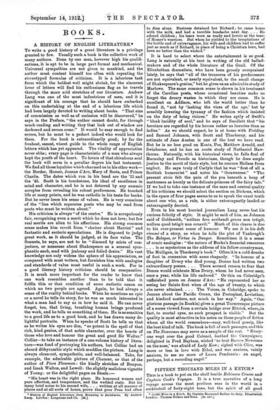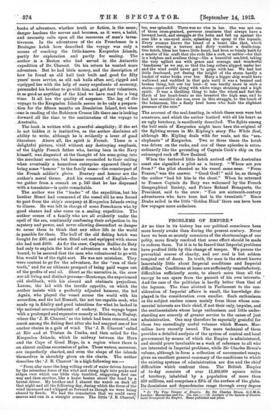FIFTEEN THOUSAND MILES IN A KETCH.*
THIS is a book to put on the shelf beside Robinson Crusoe and Captain Cook's Voyages. It is a true narrative of a long voyage across the most perilous seas in the world in a cockleshell of forty-eight tons, but the spirit of all good • 15,000 Miles in a Ketch. By Captain Raymond Rather do Baty. Illtudrated. London Thomas Nelson and Sons. L2s. net.]
, books of adventure, whether truth or fiction, is the same; danger hardens the nerves and becomes, „as it were, a habit, and necessity calls upon all the resources of man's inven- tiveness. In the adventures of the six Frenchmen in a Boulogne ketch . here described the voyage was only a means of reaching the little-known Kerguelen Jelande, .partly for exploration . and partly for sealing. The author is a Breton --who had served in the Antarctic -expedition of Dr. Cheroot. On his return he wanted more adventure. But he had little money, and the description of how he found an old hull (oak built and good for fifty years' more service, as old oak hulls often are), rigged and *quipped her with the help of many expedients of economy, persuaded his brother to go with him, and, got four volunteers, is as good as anything of the kind we have reed for ,a long time. It all has the quality of suspense. The leg of the voyage to the Kerguelen Islands seems to be only a prepare- ..tiou for the fifteen months on Desolation Island, but when .fotte is reading of the Robinson Crusoe life there one is looking forward all the time to the continuation of the voyage to The book is written with a graceful ,aimplieity.:. if tbe art .is not hidden it is instinctive, as the author _disclaims all • Ability to write, although he is evidently a lover of good 'iterature. Above-all, the ,spirit is Freneb. There is a delightful picture, vivid without any destroying emphasis, of the highly French father who, having been in the Navy himself, was disgusted at the thought of his sons going into the merchant service, but became reconciled to their calling when eventually a hazardous enterprise appeared likely to bring acme "honour" to the family name—the counterpart of the French soldier's claire. Bravery and honour are the author's moral theme. And his command of English—for we gather from ,a remark on p. 243 that he has dispensed .with a translator—is quite remarkable.
The author was the "leader" of the expedition, but his brother Henri bad command of the vessel till he-was forced
.to part from the ship's company at.Kerguelen Islands owing to illness. He was left in charge of some Frenchmen who by
good chance had also come on a sealing expedition. The Author comes of a family who are all evidently, under the *Tell of the sea, continually confessing their subjection to its ,mystery and power, and never allowing discomfort or danger to cause them to think that any other life in the world is possible for them. The bull of the old fishing. ketch was bought for £60, and when -fitted out and equipped with stores *he had cost 2600. As fcr the crew, Captain Ranier du Baty
had only to explain the kind of adventure on which he was bound, to be assured that the men who volunteered to go with him would be of the right sort. He was not mistaken. They -were content to go for the adventure, for the "run of their
'teeth," and for an ultimate prospect of being paid wages out of the profits of seal oil. -Short as the narrative is, the crew ,are all living and distinct persons—Bontemps, the experienced shellback, with his absurd and obstinate prejudices, ,Larose, the lad with the terrific appetite, on which the ,Author insists with a perfectly adjusted humour, the lad Agnes, who played the vessel across the world with his accordion, and the lad Esnault, the not too capable cook, who made up in fidelity and good intentions for what he lacked in " the national accomplishment of cookery. The voyage began with a prolonged and expensive comedy at Brixham, in Torbay, ,where the 'J. B. Cheroot,' as the ketch had been renamed, ran amok among the fishing fleet after she had snapped one of her Anchor chains in a gale of wind. The J. B. Cheroot' called • At Rio and at Tristan da Cunha, and then sailed for the Kerguelen Islands, which lie midway between the Horn and the Cape of Good Hope, in a region where there is an almost endless succession of gales. These waters, moreover, .are imperfectly charted, and even the shape of the islands themselves is sketchily given on the charts. The author describes the J. B. Cheroot' iii a high following sea :—
" From afar came the long rolling swell of water driven forward by the relentless force of the wind and rising high into peaks and ridges over which our little ship tumbled, staggering first one 'way and then another, like a horse beaten about the head by a brutal driver. My brother and I shared the watch on deck all that night and all the following day, during which the force of the wind increased and whipped us forward as though we were being chased by fiends. We had the consolation that we could carry tanvas and run in a straight course. The little `J. B. Charcot,' too, was splendid. There was no vice in her. She was not one of those cross-grained, perverse creatures that always have a. leeward lurch, and struggle at the helm and fall up against the seas like a one-eyed mule, splashing the spray to the topsails. Every seaman knows the brand of a beast like that, which makes steering a torture and dirty weather a death-trap. Our ketch, bless her brave little heart, had been BO trimly Wit by a master of his craft that she rode like a cork, or rather—for that is a helpless and soulless thing—like a beautiful sea-bird, taking the very ugliest sea with grace and courage and wonderful handiness' as we say, so that the long rollers slipped under her and the wind could never get to grips with her. We had but little freeboard, yet during the height of the storm hardly a bucket of water broke over her. Many a bigger ship would have wallowed and waddled in that gale until it was a bruised and broken thing, but our toy boat—it was hardly more in such a storm—sped swiftly along with white wings straining and a high spirit. It was' a thrilling thing to take the wheel and feel the throb of her heart-beats as she breasted the high seas, ant to feel how sensitive she was, even in this struggle, to the touch of the helmsman, like a finely bred horse who feels the slightest pressure of the rein."
The account of the seal-hunting, in 'which these men were but amateurs, and which the author loathed with all his heart as an ugly butchery, is excellently described. The fights among the bull seals of Kerguelen might have been the original of the fighting scenes in Mr. Kipling's story The White Seal, _although Mr. Kipling deals with fur seals, not the " sea- elephants " of Kerguelen. Two or three times the ketch was driven on the roeks,-and one of these episodes is extra- ordinarily like the grounding of Captain Cook's ship on the submerged rock off New Zealand.
When the battered little ketch arrived off the Australian coast she signalled a pilot as a luxury. "Where are you from ? " the pilot shouted as his vessel came near. "From France,"-was the answer. "Good God!" said he, as though the author "had hit him in the chest." When he returned to France Captain du Baty was welcomed by the French Geographical Society, and Prince Roland Bonaparte, the President, said to the crew : You are sixteenth-century -adventurers who have been lost in the twentieth." Since Drake sailed in the little Golden Hind' there can have been .few voyages more audacious.







































 Previous page
Previous page